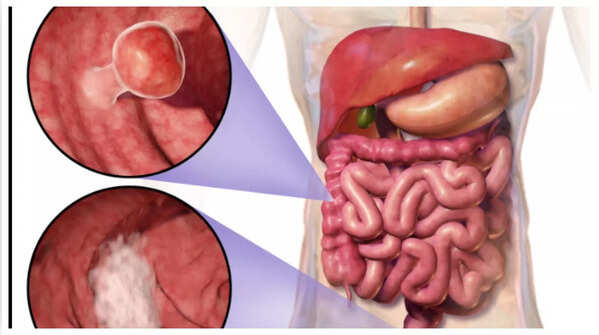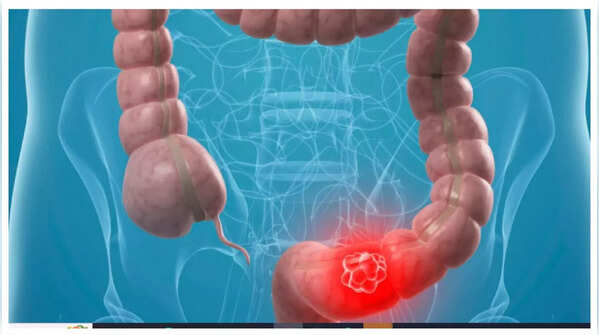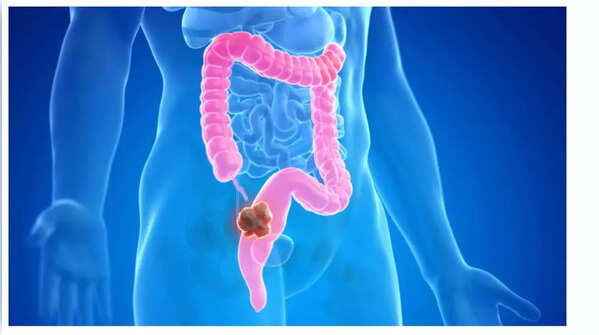Colon cancer, also known as colorectal cancer, originates in the colon or rectum, the final segment of the large intestine. It frequently begins as benign cell clusters called polyps, which can transform into cancerous growths over time. While most cases arise spontaneously, factors such as family history, obesity, and lifestyle choices can elevate the risk. Predominantly affecting individuals over 50, early symptoms can be subtle, often resembling digestive issues or stomach infections. However, certain warning signs warrant attention.

A significant early indicator of colon cancer is a noticeable alteration in bowel habits. This may manifest as:
These changes might seem insignificant or temporary, often attributed to dietary adjustments, stress, or infections. However, persistent bowel changes lasting more than a few days or recurring could signal colon cancer. Such changes suggest a potential tumor disrupting normal bowel function.

The presence of blood in stool should always be evaluated, regardless of the possibility of colon cancer. This can present as:
In some instances, bleeding may be minimal and undetectable to the naked eye, leading to anemia over time. While various conditions, such as hemorrhoids or infections, can cause blood in the stool, ruling out colon cancer is essential, especially if it occurs repeatedly or alongside other symptoms.

Persistent abdominal discomfort is another early symptom often overlooked. This can include:
This discomfort can be mistaken for indigestion or other minor digestive issues, such as constipation. However, if the pain is continuous and unrelated to diet or lifestyle changes, it could indicate a tumor causing irritation or blockage in the colon.

Unexplained and excessive fatigue or weakness can be a subtle sign of colon cancer, particularly when accompanied by other factors. Gradual, unnoticed bleeding in the colon can lead to iron deficiency anemia. The resulting reduction in red blood cells impairs oxygen transport, leading to fatigue, shortness of breath, and weakness. While these symptoms might be dismissed as stress-related or due to lack of sleep, they warrant medical evaluation.

Unintentional weight loss is a common symptom across many cancers, including colon cancer. When the body fights cancer, the immune system operates at an elevated level, and tumors can disrupt digestion and appetite. Significant weight loss without dietary or exercise modifications necessitates medical consultation. This symptom often emerges later but can sometimes serve as an early warning sign.
Disclaimer: This article is for informational purposes only and does not substitute professional medical advice. Consult a healthcare provider for any health concerns.

A balanced and nutritious diet is very important to prevent ailments.

Do not ignore if you suffer from any of these symptoms.

A cancer diagnosis profoundly impacts a person mentally, often triggering a cascade of intense emotions. Initially, shock, disbelief, and a sense of overwhelm are common, as individuals grapple with the life-altering news and the uncertainty of their future. This can quickly evolve into significant fear and anxiety about treatment, potential pain, side effects, body image changes, financial burdens, and ultimately, mortality.

Consult a doctor, if you experience any of these symptoms. Donot wait for the symptoms to worsen.

Exercise helps prevent many ailments, including cancer

Make sure you do not ignore these symptoms

If you observe these signs, talk to a doctor.

Do not ignore these signs

Identify the symptoms before its too late
Newer articles
Older articles
 Bezos-Backed Methane-Tracking Satellite Mission Ends Abruptly After Loss of Contact
Bezos-Backed Methane-Tracking Satellite Mission Ends Abruptly After Loss of Contact
 Africa's Rift Valley: Mantle Upwelling Fuels Volcanic Activity, Foretelling New Ocean Birth
Africa's Rift Valley: Mantle Upwelling Fuels Volcanic Activity, Foretelling New Ocean Birth
 7 Proven Habits to Nail Your Next Job Interview: Project Confidence and Authenticity
7 Proven Habits to Nail Your Next Job Interview: Project Confidence and Authenticity
 Smith Targets Test Return After Innovative Baseball Cage Rehab in New York
Smith Targets Test Return After Innovative Baseball Cage Rehab in New York
 5 Subtle Signs of Prediabetes You Shouldn't Ignore
5 Subtle Signs of Prediabetes You Shouldn't Ignore
 Oral Cancer: Know the Warning Signs, Risk Factors, and Why Early Detection is Key to Survival
Oral Cancer: Know the Warning Signs, Risk Factors, and Why Early Detection is Key to Survival
 Hair Oil vs. Serum: Which Elixir is Right for Your Hair Type? A Comprehensive Guide
Hair Oil vs. Serum: Which Elixir is Right for Your Hair Type? A Comprehensive Guide
 Blackcaps and White Ferns Face Packed Home Summer Against Cricket Heavyweights
Blackcaps and White Ferns Face Packed Home Summer Against Cricket Heavyweights
 Gambhir Defends India's Tailenders After Headingley Collapse; Cites Dropped Catches as Key Factor in Test Loss
Gambhir Defends India's Tailenders After Headingley Collapse; Cites Dropped Catches as Key Factor in Test Loss
 England Captain Stokes Lauds Duckett and Crawley for Blistering Start in Record Chase Against India
England Captain Stokes Lauds Duckett and Crawley for Blistering Start in Record Chase Against India